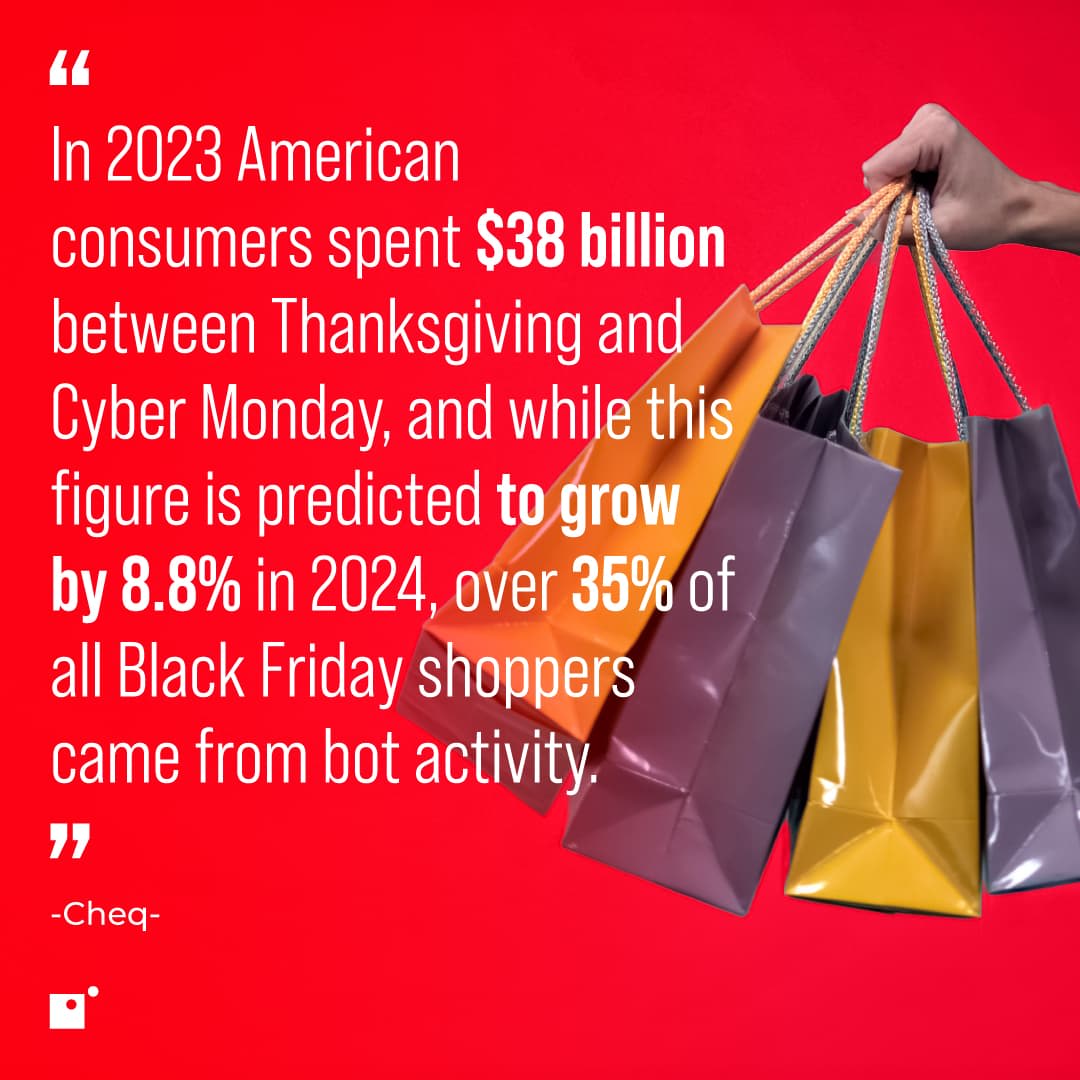Busy retailers and eager shoppers gearing up for the chaos of Black Friday and Cyber Monday should act with some level of caution as social engineering scams remain to be one of the top cybersecurity threats, and historically becomes particularly popular during the holiday shopping season.
Social engineering continues to lead the way in terms of successful cyberattacks, and scammers are only getting more sophisticated as the technology they employ, like AI for example, continues to advance.
Between social engineering scams, employee manipulation, and cybersecurity neglect, major retail holidays like Black Friday and Cyber Monday can leave unprepared organizations open to devastating cyberattacks. Not only that, but with the major influx in online shopping during these holidays, retailers make exemplary targets with large volumes of credit card transactions.
Join us below to learn more about how business owners and shoppers alike can practice cybersecurity to keep themselves and their data safe during the high-shopping-season.
Learn about modern cyberthreats and how organizations can proactively protect themselves in Impact’s webinar, Dissecting Cybersecurity Breaches: How they Happen & How to Stop Them.
Mitigating Security Risks on the Biggest Shopping Weekend of the Year
Consumer spending between Black Friday and Cyber Monday in 2024 is projected to grow by 5% and reach a historic high of $75 billion. This massive shopper presence is great for business and, unfortunately, also for cybercrime. While online platforms make it easy for retailers and consumers to process transactions, this also acts as a common attack vector threat-actors like to target.
Cyber Monday scams are also on the rise. With Cyber Monday sales reaching $12 billion during the 2023 holiday, malicious actors have yet another opportunity to take advantage of high-volume online shopping.
Phishing scams, fraudulent websites, and unprotected financial transactions are some of the risks retailers and shoppers should be concerned about during these retail holidays.
Cyberattacks Rising Over Black Friday Weekend
Businesses are aware of the increasing number of attacks that they have to defend themselves from in today’s environment. During this period of high sales volume, business and consumer vulnerabilities increase as more traffic hits popular websites, giving hackers more cover to actively infiltrate networks or execute cyberattacks.
The growth in spending, elongated shopping hours, and an increase in both mobile commerce and online sales, creates what is essentially a perfect storm for cybercrime. Retail businesses should consider these holidays when creating their overall cybersecurity strategies, and consumers should act with an extra dose of caution when making purchases around this time as well.
While consumers do need to be wary while shopping during Black Friday and Cyber Monday, protecting consumer information truly does fall to the organizations processing these transactions, making cybersecurity protocols a high priority for retail companies.
Cyberattack Fallout
Cybersecurity is a much more prominent issue for business of all sizes today than it has been in previous years.
There are a variety of factors at play here, including a far greater sophistication in the nature of attacks and an overwhelming lack of preparation among organizations with regard to their security protocols.
Businesses of all sizes are frequently targeted by cybercriminals because a lot of the time, threat actors are looking at a list of IP addresses and aren’t necessarily targeting a specific entity.
With cybercriminals lurking in the shadows during Black Friday weekend, it’s more important than ever for businesses and consumers alike to stay vigilant and protect their data.
Businesses on Black Friday
With over 76 million consumers hitting US brick-and-mortar stores last Black Friday weekend, a roughly 4.5% increase from 2022, the massive wave of shopping and spending created so much network activity that malicious actors were able to slip in to some companies almost unnoticed.
This is why it’s so important to address your organization’s cybersecurity needs all year round, so you have a plan for events like Black Friday and Cyber Monday. After all, we know how much damage can be done to an organization that is not prepared for the consequences of an attack.
Financial loss, reputational damage, and non-compliant legal fines can all stem from an unnoticed cyberbreach making it more important than ever for companies to take the necessary precautions that protect their network and consumer data during the Black Friday and Cyber Monday weekend.
Cyberthreats to Know About
Cyberthreats aren’t isolated to high-volume shopping events like Black Friday and Cyber Monday. But during these heavily-trafficked events, cybercriminals have an excellent chance to execute a breach.
Knowing what the modern cyberthreats that exist look like can help organizations prepare for these annual retail holidays.
The Human Element
The majority of security breaches occur because of the human element. This means people fell victim to social engineering, stolen credentials, or simply made an error—misplacing passwords or misconfiguring accounts, for instance.
Employees remain one of the largest vulnerabilities that organizations need to manage from a cybersecurity standpoint. As such, an initial cybersecurity training should be a part of your onboarding process, and employees should undergo additional cybersecurity trainings on a regular basis to stay security-conscious and aware.
On top of training employees on cybersecurity best practices, a security policy should be put into place as well.
Phishing
Phishing is one of the most prevalent forms of cyberattacks that organizations and employees need to look out for. A phishing attack makes use of a malicious communication that appears legitimate and aims to dupe victims into revealing sensitive or valuable information.
Phishing, smishing (SMS phishing), and vishing (voice phishing) are all designed to trick targets into compromising their network or device.
Hackers take advantage of the sales rush by using social engineering to manipulate people during the busy four-day period. Staff must be on their guard and prepared for the flurry of phishing attacks across the weekend.
Identifying Phishing Attempts
Malicious actors have improved the craft of phishing over the years. However, this type of email scam does have some red flags users should be aware of. These include:
- A sense of urgency, e.g., “Last chance to get 80% off”
- An illegitimate email address, e.g., [email protected] (notice the double Ms and Ps)
- Grammar or spelling errors
- Suspicious links (hover the cursor over them to see where they lead)
- Seemingly random or unexpected attachments
Ransomware
Clicking on a bad link can cost you a lot more than investing in a cybersecurity program. Ransomware poses a big threat for businesses, especially during busy retail seasons. Ransomware during the high sales season for retail organizations can lead to unexpected periods of downtime, a high volume of lost sales, and insurmountable damage to your reputation.
Recovering from cyberattacks is expensive and organizations should be extra careful around busy retail seasons. Furthermore, in order to avoid additional risk during these high sales periods, it’s important for organizations to address cybersecurity with a comprehensive mindset all year round.
Black Friday and Cyber Monday Retail Safety Tips
Follow the safety tips below to increase security for your online retail business as well as your personal accounts during the retail holiday season that includes Black Friday and Cyber Monday.
Avoid Public Charging Stations
If you’re going to visit brick-and-mortar stores this Black Friday, avoiding public charging stations during Black Friday and Cyber Monday weekend is a smart cybersecurity practice because these high-traffic shopping days attract cybercriminals looking to exploit distracted shoppers. Public charging stations can be a gateway for "juice jacking," where hackers install malicious software into the station’s ports.
Then, when shoppers connect their devices, malware can be transferred, compromising personal data, including login credentials and financial information. Given the surge in online shopping and transactions during this period, this threat becomes particularly critical.
Instead, individuals should opt for safer alternatives, such as using a portable power bank or charging their devices via a personal USB wall adapter. With the increased need for battery life while navigating deals, this extra step can protect against data theft.
In a season where both personal devices and online transactions are heavily used, maintaining strict control over how and where devices are charged helps reduce the risk of unauthorized access to sensitive information.
Multi-Factor Authentication
Multi-factor authentication (MFA) is a great, and very easy, way to better your cybersecurity posture. Multi-factor authentication adds a secondary authentication layer that ensures users are who they say they are.
The video below takes a deeper look at MFA solutions and how they operate.
Multi-factor authentication prevents around 99% of attacks on application accounts, according to Microsoft.
Many cyberattacks on retailers target the data bases themselves. For many businesses, these data centers are located on the cloud or in a remote, off-site location.
With off-site data servers, or most of your data on the cloud, multi-factor authentication and identity and access management protocols become more important so that organizations can limit and monitor who is accessing what data when.
Wrapping Up on Cybersecurity for the Retail Holidays
Black Friday and Cyber Monday bring with them a massive influx of both in-person and online sales. While this is incredible for businesses, it can also provide the perfect smokescreen for malicious actors and/or cybercriminals.
Keep the following cybersecurity tips in mind as we approach the busiest retail season of the year to help proactively protect your organization and your consumers.
- Cyberattacks spike during Black Friday and Cyber Monday
- Many businesses are still lacking effective measures to prevent the dangers associated with these attacks
- Organizations have a responsibility to protect the data of their customers, meaning breaches must be avoided at all costs
- Staff should be trained effectively so they can spot and deal with a threat during one of the most dangerous periods of the year
Cybersecurity is a pressing issue for organizations all year round, not just during the peak business season. Learn more about how modern organizations are combatting modern cyberthreats in Impact’s webinar, Dissecting Cybersecurity Breaches: How they Happen & How to Stop Them.



